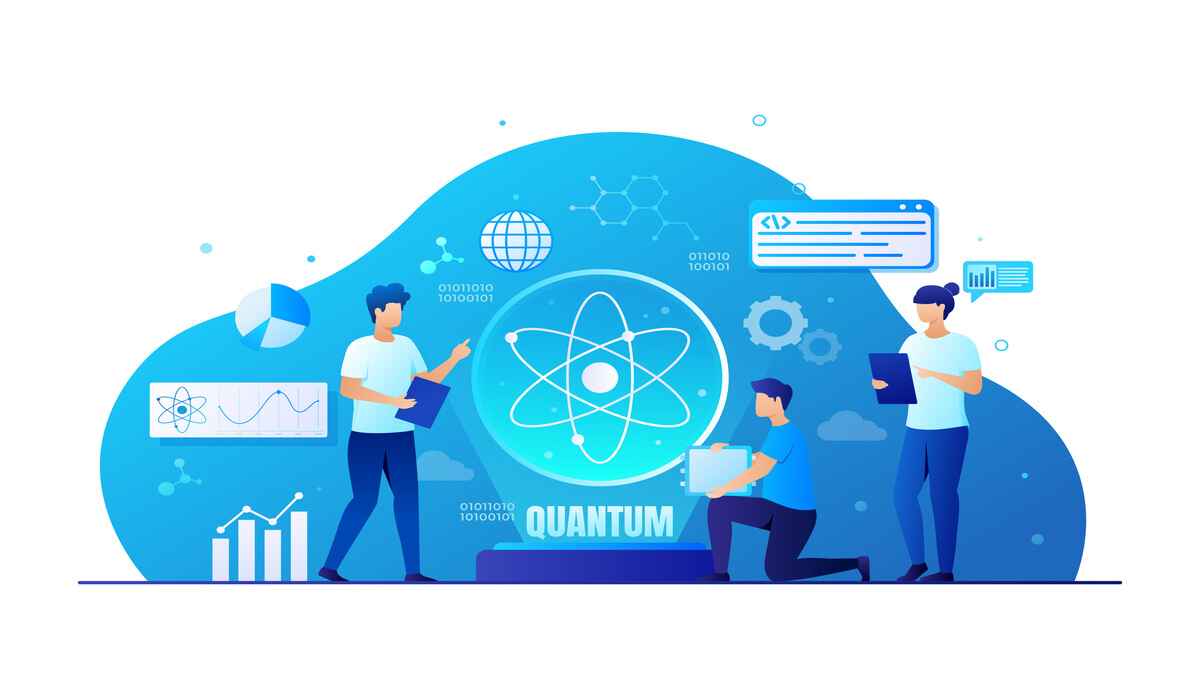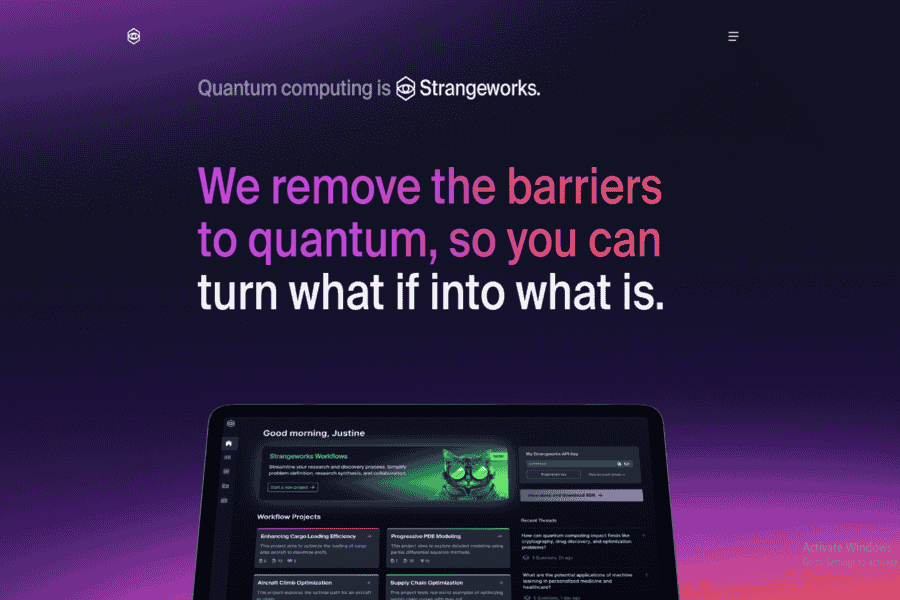Best AI Tools for Physics and Quantum Computing Research in 2025
November 28, 2024


Artificial Intelligence (AI) is rapidly transforming the landscape of scientific research, particularly in fields like physics and quantum computing. By automating data analysis, optimizing experiments, and accelerating simulations, AI is unlocking new possibilities and accelerating the pace of discovery. This paper will explore the diverse applications of AI in physics and quantum computing research, highlighting its potential to revolutionize these fields and drive innovation. Additionally, with the help of Live Chat Software and Presentation Software, researchers can collaborate more effectively and communicate their findings to a wider audience.
Physics and Quantum Computing are deeply intertwined fields, with advancements in one often driving progress in the other.
At its core, quantum computing leverages principles from quantum mechanics, a branch of physics that describes the behavior of matter and energy at the atomic and subatomic levels. Key quantum mechanical phenomena, such as:
A quantum bit (qubit) can exist in multiple states simultaneously, unlike a classical bit, which is either 0 or 1.
Qubits can become entangled, meaning their states are correlated, regardless of the distance between them.
These phenomena enable quantum computers to perform complex calculations exponentially faster than classical computers.
These qubits are made from superconducting circuits and are currently the most advanced type of qubit.
These qubits use lasers to manipulate individual ions trapped in a vacuum.
These qubits use photons, or light particles, to encode quantum information.
Topological Qubits: These qubits are based on topological quantum matter and are theoretically more stable than others.
These algorithms, such as Shor’s algorithm for factoring large numbers and Grover’s algorithm for searching databases, can solve certain problems exponentially faster than classical algorithms.
Quantum machine learning algorithms can potentialize fields like artificial intelligence and data science.
These codes protect quantum information from errors caused by noise and decoherence.
Building fault-tolerant quantum computers is a major challenge, but it is essential for realizing the full potential of quantum computing.
Quantum computing is fundamentally rooted in the principles of quantum mechanics, a branch of physics. This deep connection drives the development of both fields.
Here’s a breakdown of their relationship:
Quantum computing leverages unique quantum phenomena like superposition and entanglement, directly derived from quantum mechanics.
The basic unit of quantum information, the qubit, is a direct application of quantum mechanics, allowing it to exist in multiple states simultaneously.
Physicists research and develop materials suitable for quantum computing hardware, such as superconductors for qubits.
Laser technology, a product of physics research, is crucial for manipulating quantum states and controlling qubits.
Physicists develop cryogenic techniques to maintain extremely low temperatures, which is essential for stabilizing quantum systems.
The interplay between physics and quantum computing is bidirectional:
Quantum computers can simulate quantum systems intractable for classical computers, providing insights into complex physical phenomena.
Advances in physics, such as in materials science and quantum optics, can lead to more robust and efficient quantum hardware.
Physics provides the theoretical framework and experimental techniques that underpin quantum computing. 1 As these fields continue to evolve, they will likely shape the future of technology and our understanding of the universe.
The integration of AI into physics and quantum computing research has led to numerous benefits:
AI can rapidly analyze massive datasets, identifying patterns and anomalies that human researchers might miss.
AI algorithms can predict the behavior of complex systems, aiding in forecasting and decision-making.
AI can streamline the process of labeling and categorizing data, significantly reducing human effort.
AI can enhance the accuracy and efficiency of simulations, especially for complex systems.
AI algorithms can optimize the parameters of simulations, leading to more precise results.
AI can enable real-time analysis of simulation data, facilitating rapid decision-making.
AI can assist in formalizing and proving mathematical theorems, accelerating theoretical advancements.
AI can help identify new patterns and relationships in data, potentially leading to the discovery of new theories.
AI can design efficient quantum circuits, reducing the number of qubits and gates required.
AI can aid in developing robust error correction codes to mitigate noise and decoherence.
AI can help discover new quantum algorithms with potential advantages over classical algorithms.
AI can automate routine tasks, allowing researchers to focus on more creative and strategic work.
AI can improve the accuracy and reliability of research results.
AI can inspire new ideas and approaches to problem-solving.
AI can facilitate collaboration between researchers by breaking down language and cultural barriers.

Cloud-based quantum computing platform with a suite of AI and quantum algorithms for research.
Free access to quantum hardware; extensive documentation.
Limited qubits in free access; steep learning curve.
Free for basic access; premium pricing based on usage.

Quantum computing service with AI capabilities, offering access to multiple quantum hardware options.
It supports multiple quantum hardware and integrates with the Azure cloud.
It requires an Azure subscription; pricing can add up quickly.
Usage-based pricing.

Google’s open-source framework for hybrid quantum and classical machine learning.
Free and open-source; great for experimentation.
Limited by TensorFlow’s ecosystem; not ideal for large-scale quantum research.
Free.

Quantum cloud platform with a focus on quantum and classical hybrid computing.
Optimized for hybrid quantum applications; good for startups.
Limited qubit count; availability limited to select regions.
Custom pricing based on usage.

The quantum computing platform focuses on quantum annealing for optimization research.
Specialized in optimization; strong industry presence.
It only supports quantum annealing; it is limited to general quantum computing.
Contact for pricing.

Google’s quantum research platform offers access to various quantum computing resources.
Access to Google’s Sycamore processor; high-quality research support.
Limited public access; by invitation only.
Not disclosed; research collaborations available.

Open-source quantum computing SDK by IBM, designed for quantum research.
Free and open-source; strong community support.
Limited to IBM Q hardware.
Free.

Amazon’s quantum computing service with AI support for hybrid quantum-classical applications.
Access to multiple quantum hardware options; integrates with AWS.
Complex pricing requires an AWS account.
Pay-as-you-go based on hardware usage.

Cloud-based quantum computing platform providing access to quantum simulators and hardware.
Free access to research excellent documentation.
Limited qubit availability.
Free and paid options.

Quantum machine learning library for differentiable programming.
Open-source; strong focus on quantum machine learning.
Limited to compatible frameworks.
Free.

Quantum programming simulation environment with AI capabilities for quantum research.
High-quality quantum simulations; educational features.
Expensive; focused on simulation.
Contact for pricing.

Open-source software for simulating quantum systems, widely used in quantum mechanics research.
Free; excellent for simulations.
Limited for hardware-focused research.
Free.

Google’s open-source quantum computing framework is for near-term quantum devices.
Strong developer support; great for experimental research.
Limited to Google hardware.
Free.

Offers quantum software, including NLP and quantum chemistry tools.
Strong in quantum chemistry; high-quality quantum tools.
Expensive; specialized in chemistry and NLP.
Contact for pricing.

Tool for designing quantum hardware and simulating quantum circuits.
Specialized in quantum hardware design; open-source.
Limited use for non-hardware research.
Free.

Cloud-based quantum computing ecosystem with tools for AI and quantum research.
Good for collaboration; supports multiple frameworks.
Limited free access.
Contact for pricing.

Quantum computing and AI solutions from Honeywell and Cambridge Quantum.
Advanced quantum software; industry collaboration.
Expensive.
Contact for pricing.

The quantum computing platform focuses on neutral atom technology for research.
Advanced hardware options; European-based.
Limited global reach.
Contact for pricing.

Quantum computing research initiative by Alibaba for quantum algorithms and AI.
Supported by Alibaba; strong focus on R&D.
Limited global availability.
Contact for pricing.

Quantum computing software for AI and physics applications.
Focus on AI integration; strong support.
Expensive.
Contact for pricing.
While AI offers significant potential to revolutionize physics and quantum computing research, it also presents several challenges:
In many fields of physics, high-quality, labeled data can be scarce, limiting the effectiveness of AI models.
Biased datasets can lead to biased AI models, impacting the accuracy and reliability of predictions.
Many advanced AI models, such as deep neural networks, are often considered “black boxes,” making it difficult to understand their decision-making processes.
Complex models can overfit training data, leading to poor performance on unseen data.
Training and running large AI models can be computationally expensive, requiring significant hardware and energy resources.
Scaling AI methods to handle large-scale physics simulations and quantum computations can be challenging.
Effectively interfacing classical AI with quantum computers can be complex, requiring careful data transfer and algorithm design consideration.
Quantum systems are inherently noisy, and developing AI techniques to mitigate these errors is a significant challenge.
Ensuring that AI algorithms are fair and unbiased is crucial, especially in applications with societal impact.
Protecting sensitive data in AI research is essential to maintaining trust and avoiding misuse.
The future of AI in physics and quantum computing is brimming with exciting possibilities. Here are some key trends to watch:
I am combining classical and quantum machine learning techniques to leverage both strengths.
It is developing quantum neural networks that outperform classical neural networks on certain tasks.
I am using quantum computing to extract more meaningful features from complex datasets.
AI algorithms can optimize quantum circuit design, reducing error rates and improving performance.
AI can accelerate the discovery of new materials with superior quantum properties.
AI can help develop advanced noise mitigation techniques to improve the coherence times of qubits.
AI can optimize simulation parameters and reduce computational costs.
AI can predict the behavior of complex physical systems, leading to more accurate simulations and predictions.
AI can identify potential new materials with desired properties by analyzing vast datasets.
It is developing AI algorithms that are fair and unbiased to avoid discriminatory outcomes.
We ensure the privacy and security of sensitive data used in AI-driven research.
They are making AI models more transparent and interpretable to build trust and accountability.
AI can augment human intelligence by providing insights and automating routine tasks.
Humans can provide feedback and guidance to AI systems, improving their performance and reliability.
In conclusion, AI has emerged as a powerful tool for advancing physics and quantum computing research. By automating tasks, analyzing large datasets, and optimizing experiments, AI is accelerating the pace of discovery and enabling researchers to tackle complex challenges. As AI continues to evolve, its integration into these fields will likely lead to even more significant breakthroughs. By addressing the challenges and ethical considerations associated with AI, researchers can harness its full potential to shape the future of science and technology.
